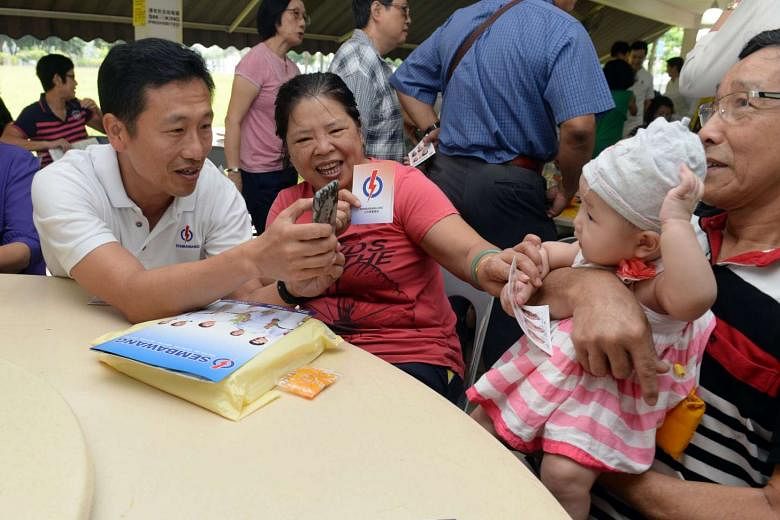SINGAPORE - Mr Ong Ye Kung is a less angsty man these days.
Gone is the frenetic rhythm of his ill-fated 2011 campaign as part of the People's Action Party (PAP) team in Aljunied GRC.
The 45-year-old now walks at a slower pace, taking his time to chat with residents as he goes on the campaign trail in Sembawang.
An inner calm seems to also have been restored to him, following what he described in 2011 to The Straits Times as a painful "blow" following his team's historic defeat by the Workers' Party (WP) - Aljunied was the first GRC lost by the PAP.
"You get less angsty when you worry less about the result, and you focus more on the journey and the process," he said on Monday (Sept 7) as he knocked on the doors of Housing Board flats and visited a coffeeshop.
It probably helps that he is getting an easier ride this time.
The former high-flying civil servant is being fielded as part of the Sembawang GRC team, viewed as a far safer ward compared to Aljunied GRC which was - and is - contested by the WP's "A" team led by party chief Low Thia Khiang.
Asked about this, and also why he did not return to Aljunied this time round, Mr Ong said: "It works like this: We give a binary answer to the party - do I run or do I not run. For us, we say yes and we are deployed to where we are needed more. It was Aljunied in 2011, and Sembawang in 2015."
It is clear that the ruling PAP has big plans for Mr Ong.
At the rally in the Central Business District on Tuesday (Sept 8), Prime Minister Lee Hsien Loong highlighted him as one of the candidates with the potential to lead people.
Prior to joining politics, Mr Ong was PM Lee's former principal private secretary and Singapore Workforce Development Agency chief executive.
In an impassioned speech at Sembawang GRC's rally on Monday, Mr Ong spoke of how the 2011 GE divided Singaporeans who did not "come back together" until founding prime minister Lee Kuan Yew's death this year.
More than four years later, Mr Ong is reluctant to dwell on the Aljunied defeat. "Life took a different path and whether it's a better path depends on you. If you drown yourself in self-pity, that's when you become a failure," he said.
In 2012, he quit the National Trades Union Congress as its deputy secretary-general and joined Keppel Corporation a year later, a move which he said was to gain private sector experience.
He brushed off suggestions that he has fallen behind his peers in 2011, who together with him had been named as the fourth-generation leaders. They include Mr Chan Chun Sing, Mr Tan Chuan-Jin and Mr Lawrence Wong, all now helming various ministries.
Said Mr Ong: "I had four years of good experiences. That portfolio of experience gives me a broader perspective of things."
Late last year, he was approached by the party to be fielded again. "So, I had to discuss with my family - my wife and two daughters."
His 15-year-old daughter, the older of two, sent him a text message after the family meeting. "If this is what you want to do, I will support you, but because I know when I really want to do something in future, you will support me."
During a two-hour walkabout that The Straits Times tagged along on, more than half of the residents he met recognised him from the Aljunied campaign in 2011.
They included an old woman at a seventh floor flat in Canberra Road who knew his parents. "I knew your parents," said the woman who looked to be in her 80s. "I was a Barisan Socialis member. How are your parents?"
He replied in Mandarin: "My mother passed away last December." The old woman conveyed her condolence.
"It is so sad when I meet such residents. I cannot go back to my parents to tell them that I met her," Mr Ong told this reporter as he walked down the stairs to the sixth floor.
His father, Mr Ong Lian Teng, was one of 13 Barisan Sosialis MPs elected in the 1963 General Election who walked out of Parliament over National Service. He subsequently quit politics and died in 2009 at age 84. Mr Ong's mother, Madam Ng Soo Lung, died in December last year at age 80.
His family background along with his electoral experience makes Mr Ong stand out among the slate of PAP candidates.
During his door-to-door visits, he kept the advance party small and slowed his pace, typically spending several minutes talking to those who open their doors.
It was a lesson from 2011.
"It's not a matter of efficiency. You have to interact with residents," he said. "I won't say I'm slow, but I'm a bit slower now. It is a conscious decision and I brief my volunteers on how I want the door-to-door visits to be done."
He would not be drawn into speculating on his chances of getting into Parliament in his second bid, but he said that he is worried about the election dividing people again. "That is not worth the results."
Still, he acknowledged that there is a tide of desire for alternative voices, which in turn propels the ruling party to be more responsive. "It is not just in Singapore, but technology makes all organisations around the world seem to be running a lot faster and being more attentive to people they serve," he said.
When asked if it is a good or bad thing, he replied: "It is immaterial, it's happening. You want to be in this business, we got to accept that."
But he said that there still has to be a limit and balance in responding to the desire for alternative voices.
"Say you eat soft boiled egg, you put a bit of soya sauce, it tastes better and because it's better, you tambah ("throw" in Malay) one tablespoon. You put some more, it becomes soya sauce with egg, rather than egg with soya sauce.
"So there's a limit to everything. That limit depends on the track record of the existing government, the track record of the opposing party, and the respective visions they have for the future."
The future leaders of Singapore, he said, have to be grounded in the concerns of the people.
It is important to be relatable, he said. "You can't solve everyone's problem but government can introduce policies that can address most people's concern."
When asked about the prospects of him becoming a future prime minister, he replied with a smile: "That's pushing it way too far."


